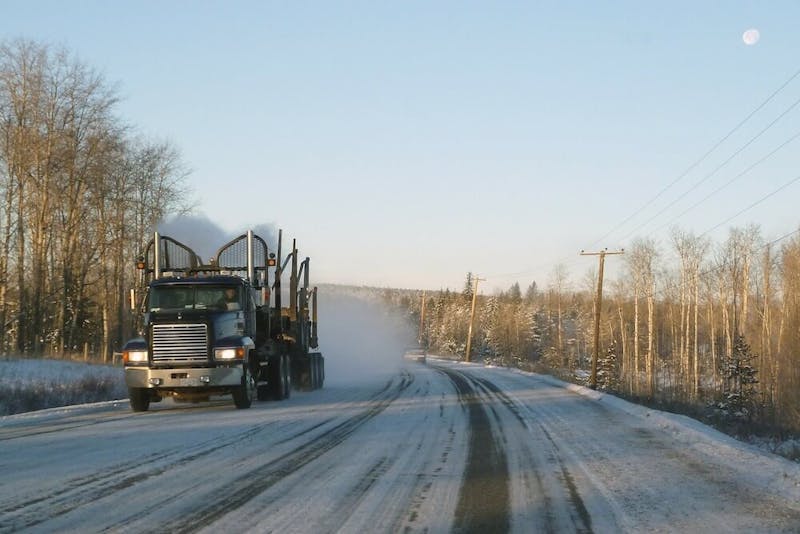
Commercial trucks play an important role in society. Whether purchasing food from the grocery store or clothes at the mall, you rely on big trucks like tractor-trailers and 18-wheelers almost every day. Unfortunately, these trucks also pose a serious threat to your safety. Trucking accidents are a well-known hazard for drivers and passengers alike.
The safety challenges associated with big trucks can be even more destructive in poor weather conditions. We’ll cover the risks associated with icy roads, the factors that affect big rigs in winter, driving safety tips, and the injuries that can occur in ice-related crashes. If you have suffered injuries and damages in a collision involving a tractor trailer, we may be able to help you.
Common Factors in Trucking Accidents
It is helpful to first understand the dangers associated with large trucks even in good weather. The average fully loaded commercial truck weighs as much as 30 times more than a passenger vehicle. The sheer force of such a large and heavy vehicle compared to the average car means that most truck accidents have severe or even fatal outcomes.
Weight is not the only reason that driving next to a truck is dangerous. You’ll also want to keep the following in mind when you are sharing the road with big trucks:
- Braking Time – Big trucks typically take much longer to come to a complete stop.
- Hours of Service and Fatigue – Federal hours-of-service regulations allow truck drivers to spend upwards of 11 hours behind the wheel, so driver fatigue is common.
- Defective Equipment – Trucking companies that do not perform regular maintenance are more likely to still use trucks with defective, faulty, or broken equipment.
- Truck Underride – In a collision, passenger vehicles can slide underneath trucks without underride guards.
Types of truck accidents can vary wildly, too. Rear-end collisions, rollovers, wide turns, and accidents caused by jackknifing can happen at any time.
Navigating Icy Roads in a Big Truck
Icy roads are one of the biggest concerns during inclement winter weather. In the United States alone, around 116,800 people suffer injuries in winter weather car crashes every year. This includes icy, slushy, or snowy conditions.
Unlike snow, ice is much harder to spot from behind the wheel of a vehicle. Ice can also be present in patches rather than covering the whole road, catching drivers off guard and giving them little time to react. Truck drivers should always exercise caution when the weather conditions are right for ice, even when the roads do not look slippery.
Although losing control on ice can happen under virtually any circumstances, applying the brakes is one of the most common catalysts. Truck drivers can minimize the risk of causing an accident when trying to brake in icy weather conditions by slowing down, maintaining distance from other vehicles, and slowly braking for things like traffic lights and stop signs.
It is also helpful to understand when and in what conditions ice might form on roads. Here are just a few factors that play a role in icy conditions:
- Temperature – Ice can form when the temperature is 32°
- Time of Day – Even if the high temperature for the day is forecast to be higher than 32°, you can still encounter icy conditions in the early and later parts of the day when the temperature is naturally cooler.
- Type of Road – Bridges, interstate overpasses, and elevated roadways tend to ice over before other types of roads.
Being aware of these factors also means being aware of when it is time to pull over. Truck drivers should always be willing to pull over and wait out poor weather conditions until they can safely travel on roads again.
How To Drive Safely Near Trucks on Icy Roads
One of the best ways to share roads with big trucks in icy conditions is to keep your distance. If the flow of traffic does not allow you to maintain a safe distance, you should not engage in risky driving behaviors to try to get away. Remember, commercial trucks take even longer to brake on icy roads, so cutting one off could cause a rear-end collision.
A better approach is to slow down and maintain awareness of what is going on around you. If you are next to a tractor trailer and can’t get away, do your best to avoid driving in its blind spots, near its axles, or between it and another truck.
If possible, it might be better to take an alternate route to avoid big trucks altogether.
Types of Injuries Associated With Icy Road Truck Accidents
Those who are fortunate enough to survive a truck accident often still have an uphill road to recovery. Injuries associated with big trucks are often severe, and may include:
- Soft Tissue Injuries – These occur in the soft tissues of the body, including ligaments, muscles, and tendons.
- Head Injuries – Among the most serious of accident injuries, concussions and other traumatic brain injuries fall under this umbrella.
- Neck Injuries – Whiplash is probably the most well-known example of a car accident neck injury and may cause lasting pain.
- Broken Bones – The limbs are especially vulnerable to broken bone injuries, although broken ribs are also a possibility.
Getting the help you need to recover from a truck accident should not cause any further harm in your life. Sadly, many insurance companies prioritize their own bottom lines over the health and well-being of injury victims. If you are unsure of how to proceed after your own winter weather accident, know that you are not alone. At McMath Woods P.A., you can schedule a free consultation to find out more about your options.

